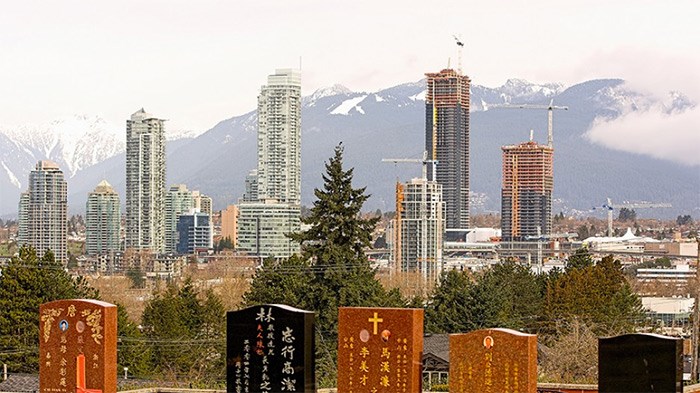 Skyscrapers loom over Forest Lawn Cemetery in Burnaby, highlighting pressure felt by the funeral services industry by shrinking availability of burial properties and high land costs | Chung Chow
Skyscrapers loom over Forest Lawn Cemetery in Burnaby, highlighting pressure felt by the funeral services industry by shrinking availability of burial properties and high land costs | Chung Chow
If you thought being six feet under might free you from Metro Vancouver’s stratospheric real estate market costs, you would be mistaken.
The business of the dead is booming, and Metro Vancouver is home to a number of memorial companies that are subject to the same pressures of rising prices and disappearing space faced by property developers in the region.
This could lead to rapidly rising burial costs in an industry whose clients are already struggling with the emotions of losing loved ones and the complications of religious commitments.
According to research done on behalf of Arbor Memorial Inc., the value of cemetery property at Valley View Funeral Home and Cemetery in Surrey, which is owned by Arbor, has increased 5% to 7% annually over the past few years.
Arbor is a family-owned Canadian company established in 1947 that provides internment rights, cremations, funerals and associated services to families across the country. It is headquartered in Ontario.
The company owns 41 cemeteries, 28 crematoria and 92 funeral homes in provinces across Canada. Within the Vancouver area, Arbor operates one funeral home in Richmond, two in Surrey and one in Ladner.
“As one of Canada’s largest cemetery and funeral home providers, we know most Canadian families prefer some form of memorial property when considering their final arrangements,” said Dustin Wright, the company’s director of marketing communications.
“In many large Canadian cities, increases in sales of homes, rapid development and population growth have resulted in a diminishing availability of burial property.”
Burial prices at Valley View can range from roughly $5,000 to $22,500 for traditional ground plots. Traditional burial plots are still hotly desired, with 43% of families choosing traditional ground burials and 57% opting for various cremation interment options, according to Arbor.
Cremation property prices range from roughly $1,000 to $1,600 for cremation lots (which are significantly smaller in size) and $3,000 to $24,000 for above-ground cremation niche spaces, which are offered in both indoor and outdoor facilities.
Monuments and other additional memorial materials carry extra costs and are subject to restrictions.
Another large player in the space is Dignity Memorial, which is owned and operated by Service Corp. International, a U.S. provider of funeral goods and services. The company is headquartered in Texas and employs over 24,000. In Metro Vancouver, Dignity Memorial operates 10 assorted memorial service homes.
One of the largest cemeteries in the Vancouver area is Mountain View Cemetery on Fraser Street, which is owned by the City of Vancouver. The 106-acre cemetery has approximately 92,000 grave sites and 145,000 interred remains.
“We first filled up in 1964 and then closed in 1986. We reopened in 2008 so in terms of casket space, we were able to reclaim about 1,000 sites, so we have 400 to 500 of those sites available now,” said Glen Hodges, manager at Mountain View Cemetery.
“We will probably go through another round of reclamation and we might have around 700 to 800 casket graves left in the cemetery,” Hodges said. “We have about 400 to 500 now and probably another 200 to 300 that we can reclaim over the next 10 years or so.”
Hodges acknowledges that it will run out of space eventually and that demand for traditional burials will continue as people are willing to pay despite the increase in land prices.
“The casket space at our cemetery ranges between $23,000 to $25,000. That’s for a four-foot-by-eight-foot space, and in our cemetery, that will accommodate up to two caskets within any 40-year period and up to eight interments of human remains, so it’s a fairly high-capacity space.
“We are one of the only cemeteries in Canada that actually allows families to reuse their grave space,” he added. “A family, at the family’s request and with their permission, will allow them to have a third or fourth or fifth casket burial in existing family law.”
As with all industries, regulations and requirements vary province to province, and B.C.’s laws are unique in Canada.
“Cemetery space in B.C. is all sold in perpetuity, so you pay for it once and that person owns that right forever, and the cemetery takes a portion of that money and has to put a minimum contribution to the care fund.
“There is no ongoing transactions after that except for any fee related to place a monument or marker on the grave or the fee for the internment of additional remains in the grave,” Hodges said.
“No annual maintenance cost or renewal after a certain number of years.… The cemetery puts a mandatory minimum to the care fund, and it’s the interest off that care fund that the cemetery can use to offset any ongoing maintenance costs. That’s the legislation in B.C.”


